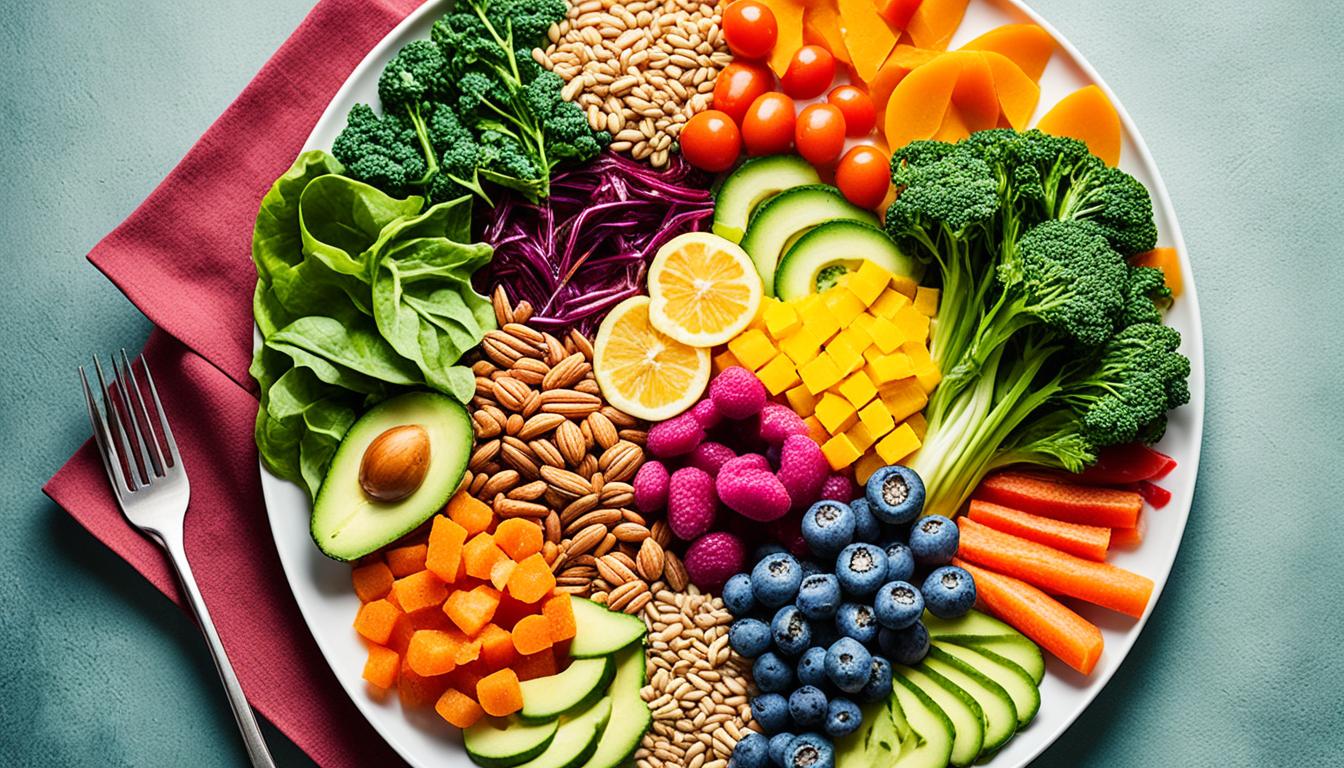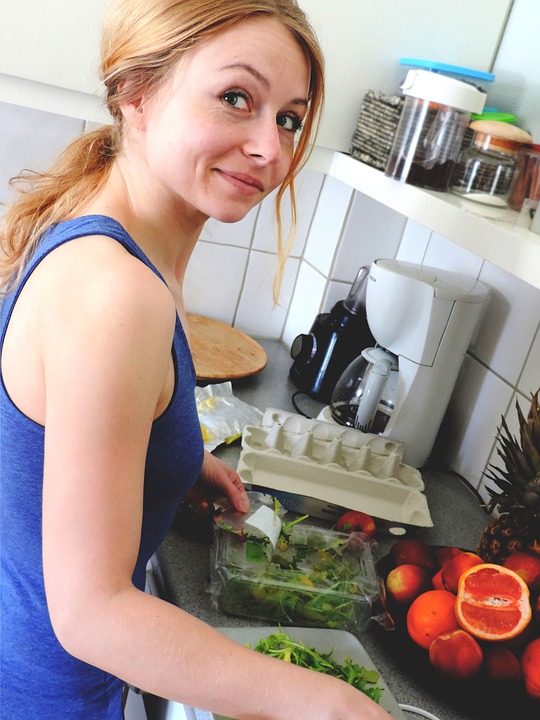Having PCOS can sometimes make you feel like you’re fighting your own body. You deal with things like not knowing when your period will come or trying to stop gaining weight. It’s hard and it takes a toll on you both physically and emotionally. But remember, you’re not alone. I’ve been there.
When I found out I had PCOS, I was confused and felt like it was me against my body. I didn’t know what to do to fix things. Then, I learned about how low GI foods can change everything. These foods are simple, yet they have the power to help you manage PCOS. They can make you feel in control and bring back hope.
So, what’s a low GI diet for PCOS and how does it work? How can it make things better? Well, let’s take a closer look. We’ll see how adding low GI foods to your diet can help with weight, hormones, and even trying to have a baby. These changes might seem small. But they can truly change your life.
Key Takeaways:
- Living with PCOS can be tough, affecting you both physically and emotionally.
- Low GI foods can really change how you deal with PCOS.
- Eating a low GI diet can help with symptoms and make you healthier.
- It can affect your weight, hormones, and even your chances of getting pregnant.
- By eating differently, you can take back control and have a brighter future.
What is PCOS?
Polycystic Ovary Syndrome (PCOS) is a hormonal disorder affecting 5% to 10% of women worldwide. It leads to cysts on the ovaries, causing irregular periods and hormonal imbalances. Women with PCOS also face a higher risk of infertility. It often links to insulin resistance, which may result from weight gain.
Having PCOS makes women’s bodies resist the effects of insulin. This leads to too much insulin in their blood. Such a condition can disrupt ovulation and increase testosterone production by the ovaries.
PCOS & Insulin Resistance
Insulin resistance is key in how PCOS starts and gets worse. It’s not fully clear why PCOS happens, but it’s linked to a problem with insulin. Women with PCOS have cells that don’t react well to insulin. This keeps their insulin levels too high.
Study shows that many overweight women with PCOS have issues with moving glucose and using insulin in their muscles. This causes high blood sugar and worsens insulin resistance. What’s more, it messes with how their ovaries work.

Too much insulin in PCOS harms ovulation and adds to too much testosterone from the ovaries. Insulin boosts the making of androgens, like testosterone. This upsets the hormone balance and can lead to things like irregular periods, acne, and more body hair.
Dealing with insulin resistance is a big part of handling PCOS. Eating right and staying active can help fix insulin issues. This can make PCOS symptoms better, balance out the hormones, and help with health overall.
The Low GI Solution for PCOS
A low glycemic diet helps a lot with PCOS symptoms. It’s good for keeping your weight in check and helping your body use insulin better. It also balances hormones and boosts fertility.
High GI foods make your blood sugar and insulin spike fast. But low GI foods release sugar slowly. This means you feel full longer and your insulin stays steady.
Studies show that a low GI diet improves how your body uses insulin in PCOS. This is good for not just your weight but also your cycles, which helps you get pregnant.
Eating low GI foods daily keeps your blood sugar stable and hormones in balance. This can reduce symptoms like irregular periods, acne, and extra hair.
This diet also supports weight control by keeping you satisfied longer. It stops you from snacking too much and encourages better eating habits.
Lowering insulin resistance is key for those with PCOS at risk of type 2 diabetes. A low GI diet can make your blood sugar levels steady, helping avoid diabetes.
On top of this, a low GI diet can regulate your menstrual cycle and boost fertility. It smooths out other signs of hormonal imbalance linked to PCOS.
Choosing a low GI diet for PCOS is a smart move for better health. It changes the way you eat to help your body work better, improving how you feel every day.
Low GI Diet for PCOS
A low GI diet for PCOS means eating foods with a glycemic index of 55 or lower. It also includes some foods with a GI of 56 to 69. This method helps keep blood sugar stable and fights insulin resistance. Doing this supports weight control, hormone balance, and your health.
Choose non-starchy vegetables for this diet. Things like cauliflower, spinach, and sweet potatoes are full of fiber and nutrients. They’re low in calories and carbs. So, they don’t raise blood sugar too much and help you manage your weight.
You can eat fruits in this diet as long as they’re not too sugary. Berries, grapefruit, and apples are good choices. They’re nutritious, tasty, and won’t spike your blood sugar too high.
Whole grains like steel-cut oats and quinoa are great for steady blood sugar. They’re full of fiber and carbs that your body uses slowly. This means they keep your energy level steady and help avoid insulin spikes.
Don’t forget lean proteins. Eggs, salmon, and turkey are good for keeping weight in check. They also support your hormones and can help with fertility. These proteins give you essential nutrients without too many carbs or fats.
Healthy fats are also key. Olive oil, avocados, and nuts are full of good fats. They help balance your hormones and keep your meals tasty. Including these fats improves how your body uses insulin, which is crucial for PCOS.

A low GI diet for PCOS offers many tasty and nutritious foods. Adding in these carbs, proteins, fats, fruits, and vegetables can make a big difference. They can help you handle your PCOS symptoms and feel better overall. So, make sure to include them in your meals every day.
Want to know more about how a low GI diet helps with PCOS? Check out this research article.
The Benefits of Low GI
Choosing a low glycemic diet for PCOS has many good points. It can greatly improve your health and how you feel every day.
One big plus of eating low GI foods is weight loss help. These foods keep you full, so you eat less. They also help cut down on cravings. This helps a lot with losing weight and keeping it off.
A low GI diet is also key in stopping diabetes. PCOS increases your chances of getting diabetes because of high insulin. Eating low GI foods helps keep your blood sugar in check. This lowers your diabetes risk and keeps you healthy.
Low GI diets are good for fixing hormone trouble too. Eating foods that are high in GI can make your symptoms worse. Symptoms like bad periods, acne, and mood swings. By choosing the right foods, you can help balance your hormones. This is really important for your reproductive health and mood.
A whole-health focus is vital when dealing with PCOS. The benefits of a low GI diet are huge. It helps with weight, lowers your diabetes risk, and keeps your hormones in check. This makes managing PCOS easier, and it improves your life quality.

If you want to learn more about low GI diets for PCOS, check out this study. It was done by experts in the field.
Foods to Avoid
When you’re on a low GI diet for PCOS, the types of food you eat are crucial. Steering clear of high GI foods is key to handling PCOS symptoms and boosting your health. Let’s look at some high GI foods you should dodge:
1. Refined Carbohydrates
Avoid refined carbs like white bread, rice, and pasta. These foods can quickly raise your blood sugar and insulin, not good for PCOS. Choose whole grain options for better energy and a slower sugar boost.
2. Sugary Beverages
Skip fruit juice and soda to keep your sugar and insulin in check. These drinks aren’t good for your weight or PCOS symptoms. Try water, herbal tea, or water with fruit and herbs instead.
3. Fried Foods
It’s best to cut back or quit fried foods. They usually rank high on the GI, causing quick blood sugar rises. Instead, cook by baking, grilling, or steaming to lower the GI of your meals.
Avoiding high GI foods and opting for healthier choices can greatly help with PCOS management and your well-being in general.

Keeping to a low GI diet is very beneficial for managing PCOS and boosting health overall. By taking charge of your diet, you’re choosing a path of wellness for your PCOS journey.
Additional Tips for Managing PCOS
Following a low GI diet is key for PCOS management. Adding regular exercise is crucial too. Exercise helps with weight, makes your body use insulin better, and keeps your mind healthy.
For PCOS exercise, pick what you like and can do every day. Walking, biking, swimming, and lifting weights are good choices. They help your body handle insulin, keep blood sugar stable, and make you healthier.
Working out boosts weight loss and cheers you up. It makes you feel good by releasing endorphins. This can lower feelings of sadness and stress, making you feel better.
Start exercising slowly and grow it bit by bit. Try for 30 minutes of moderate exercise most days. Any activity helps, like climbing stairs or a walk at lunch.
Always check with your doctor before a new exercise plan, especially if you’re sick. They’ll make a plan just for you. They can make sure the exercise is right for you, based on your health and goals.

Benefits of Exercise for PCOS:
- Promotes weight management
- Improves insulin sensitivity
- Regulates blood sugar levels
- Boosts mental health
Exercising with a low GI diet helps a lot. It makes PCOS symptoms better and boosts your health and happiness.
Treatment Options for PCOS
Diet change is a top treatment for PCOS. Changing my diet made a big difference in handling my symptoms. Focus on eating foods that are rich in nutrients but have a low glycemic index.

Eating nutrient-packed foods every day, like whole grains and lean proteins, helped me with my weight. It also kept my insulin levels in check. These changes are key to dealing with PCOS and living healthier.
For PCOS, a diet with a low Glycemic Index (GI) is very good. It’s about eating foods that digest slowly, not causing quick sugar or insulin spikes. Choosing low GI foods, like whole grains and some fruits, helped me control my weight and insulin resistance.
Besides changes in what you eat, there are other ways to treat PCOS. This can be through meds, hormone treatment, or changing how you live. It’s vital to work with a doctor to find the best treatments for you.
If you want to know more about treating PCOS, this resource can help: PCOS Treatment Guide. It offers great tips and info for your PCOS journey.
To handle PCOS, you need a mix of steps like changing your diet, taking meds if needed, and making lifestyle changes. This way, you can manage your PCOS and feel better overall.
Conclusion
Managing PCOS through diet can greatly help. Eating low GI foods makes a big difference. It helps balance hormones, keeps weight in check, and lowers insulin resistance. This approach is part of a bigger plan. It includes exercise and lifestyle changes. Together, they handle PCOS symptoms well and boost health.
Considering a low glycemic diet for PCOS is wise. These foods don’t spike blood sugar fast. They can keep insulin and hormones steady. This leads to better symptom management. Plus, it’s good for staying healthy. You’ll find it easier to keep weight and hormones balanced over time.
For more info on low GI diets and PCOS, check out this helpful article. Choosing a healthy lifestyle is key. It helps manage PCOS naturally and effectively. Making smart food choices matters a lot.














